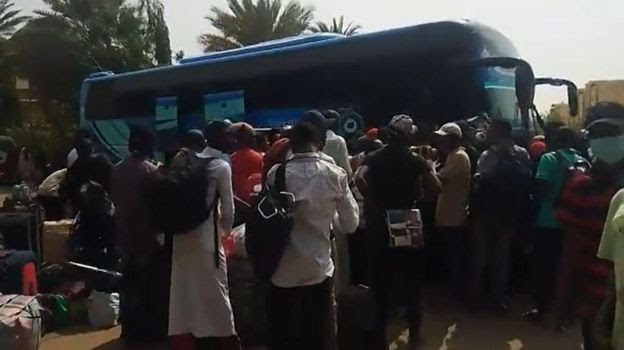The Federal Government says about 1,519 stranded Nigerians in Sudan are expected to leave the capital Khartoum via hired buses to Port Sudan and other designated border points for their onward evacuation to Nigeria.
This development followed the extension of another 72 hours ceasefire agreement reached between the Sudanese Armed Forces and Para-military Rapid Support Forces in Sudan.
The News Agency of Nigeria (NAN) reports that Port Sudan is a port on the Red Sea in Eastern part of Sudan and the Capital of the State of Red Sea.
The Permanent Secretary with the Federal Ministry of Humanitarian Affairs, Dr Sani Gwarzo, confirmed this while briefing newsmen on the situation with Nigerian students in Sudan on Sunday in Abuja.
Gwarzo, who is the chairperson of the federal government situation room, on the evacuation exercise, explained that the stranded students are expected to leave on April. 30.
He said government had already secured 31 buses in addition to the reserve buses kept in case of unforeseen circumstances.
“We have given the bus company our word that under no circumstances shall they leave anybody on ground; even if it is one more person that is remaining let them activate our reserve list and bring out the new buses.
“And I spoke to the student leader and the Embassy in this regard, so we are expecting each bus will carry 49 persons and if you calculate this number times 31 buses it will give you the number of persons to be evacuated today,” he said.
The federal government also clarified the controversy over the 1.2 million dollars used to hire buses for the evacuation of stranded Nigerians from Khartoum to the designated border point.
“Do you know how much it takes to hire a bus from Khartoum to the border?, is 30,000 dollars per bus and you times it by 40 buses, that is where 1.2 million dollars comes into.
“ So, we transfer the first tranche of the money approved by federal government, which is 400,000 dollars, to them as deposit if you take our 400,000 dollars what does it come to you is 1/3 of the total sum.
“ So, they gave us 13 buses times 30,000 dollars it will give us 390,000 dollars believing that will continue with the evacuation, but they stopped giving us buses that our money has expired.
”But, they kept the remaining 10,000 dollars and told us that our money has finished untill we complete the remaining balance because we are meant to understand in Sudan there is nothing like you deposit money until assignment is done before you complete the remaining balance.
“We started transferring the remaining balance in tranches and believe me you don’t transfer money to Sudan directly, you have to get somebody who knows the company who will transfer and give them cash then go into agreement.
“And the transport company threatened that they will not move on with the evacuation process and whoever thinks that 1.2 million dollars will be enough to move people from Khartoum to the border and airlift them to Nigeria is being economical with the truth,” he said.
Gwarzo further explained that the federal government had to enter into agreement with the transport company to ensure due process were followed in the transfer of the funds.
“We signed an MoU with them and at every stage we report this to DSS and NFIU so that they can monitor the movement of the money.
”And the company too should know that in Nigeria if you transfer money from government account, it does not go direct because it has a dashboard that it can be seen.
“We had to alert the DSS and NFIU before we send this money, though in the process the money got delayed by the Central Bank System and this is what they call swift electronic cash transfer system, it got delayed,” he said.
According to him, that is the hitches they experienced in the first phase of the evacuation exercise.
He therefore emphasised that the federal government is more interested in the safety and successful evacuation of the trapped students.
Gwarzo said while government is doing its best to evacuate them, he also urged the media to report subjectively as the health and safety of the evacuees and the emotional feelings of their parents are at stake.









